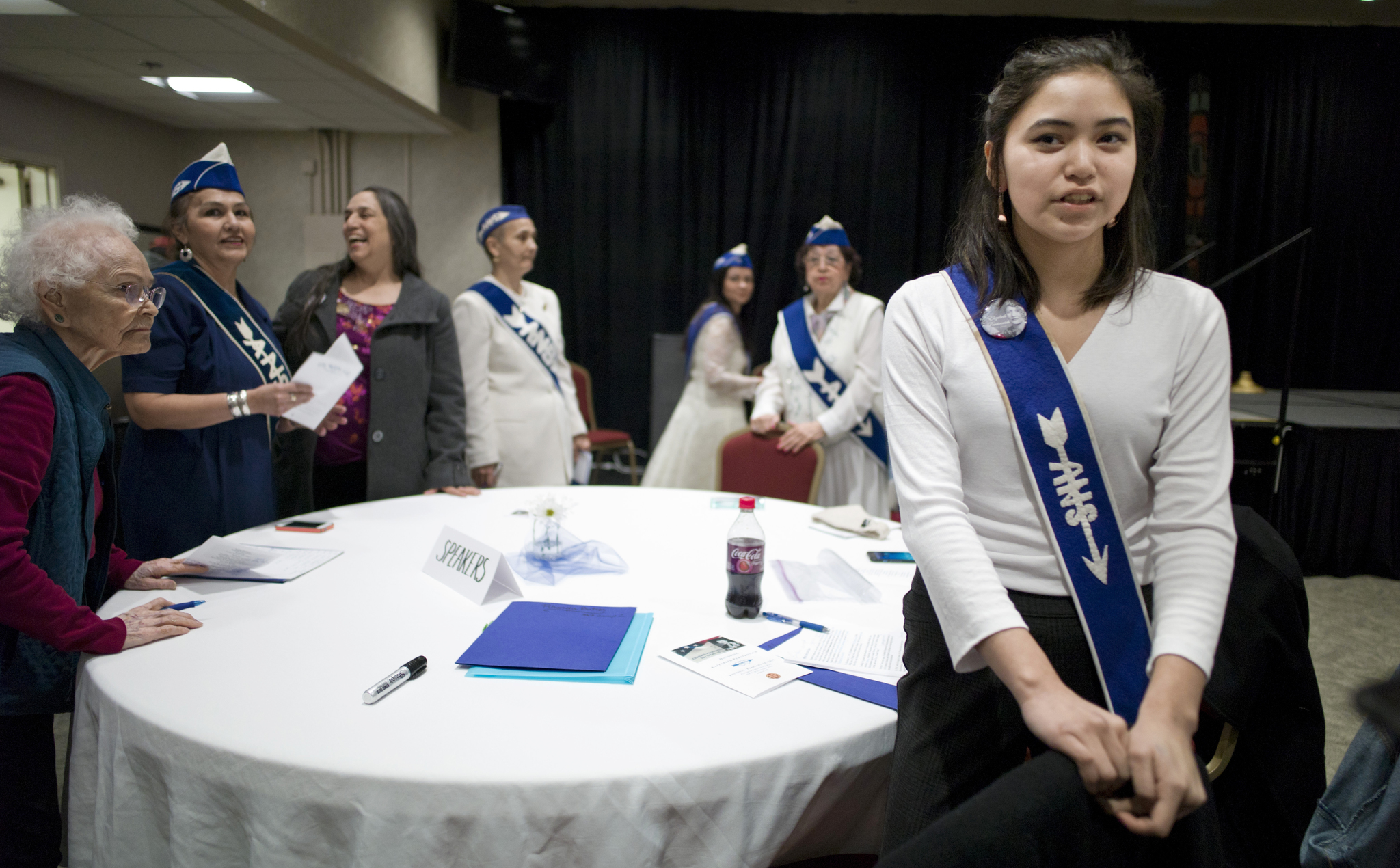Seventy-two years ago this month, Elizabeth Peratrovich stood before the Alaska Senate and told a room full of white men what real savagery looks like.
Peratrovich, then Grand President of the Alaska Native Sisterhood, spoke of the human toll of discrimination, adding a previously-unheard Alaska Native voice to the Senate’s debate over the 1945 Anti-Discrimination Act.
“I would not have expected that I, who am barely out of savagery, would have to remind gentlemen with 5,000 years of recorded civilization behind them, of our Bill of Rights,” she said, bringing the whole room to their feet with applause.
Peratrovich’s retort came in response to a territorial senator, who had asked, “Who are these people, barely out of savagery, who want to associate with us whites, with 5,000 years of recorded civilization behind us?”
Gov. Ernest Gruening signed the act into law on Feb. 16, 1945 with Peratrovich standing over his shoulder.
“Superior race theory hit in hearing” was the headline in the Alaska Daily Empire after Peratrovich’s speech. As hard as it is to imagine that headline in 2017, it’s even harder to conceive of anyone whose example has meant more than Peratrovich’s.
That’s why the ANS and the Alaska Native Brotherhood have gathered annually since 1988 to celebrate Elizabeth Peratrovich Day in honor of Alaska’s most iconic civil rights hero.
Fittingly, the groups met Thursday at Elizabeth Peratrovich Hall in downtown Juneau.
ANS Camp 2 president Rhonda Butler read a short biography of the late civil rights leader to open the ceremony.
“I always, no matter how many times I’ve read her bio, it chokes me up,” Butler said. “To hear the part where she talks about the children wanting to go into the movie theaters and stores and seeing those signs that referred to Native peoples as dogs.”
One of ANS’ core missions is honoring elders and building up younger sisters. Talking civil rights history helps them do this.
They don’t shy away from the ugly parts.
“I think it’s important, even though it’s so harsh, we openly talk to the kids about it. They need to know that those are some serious injustices and one person can make a difference,” Butler said.
As a testament to ANS’ cross-generational message, 14-year-old recording secretary Alayna Duncan — the youngest elected ANS official currently working — spoke before the sisterhood awarded their Mildred Pierce Award to lifetime member Katherine Hope.
Hope, now in her 70s, was just a 5-year-old attending a Presbyterian mission school in Haines when Peratrovich spoke on the Senate floor. She was honored for her lifetime of volunteer work with the ANS.
Raised in a white man’s culture, Hope didn’t see a totem pole until she was 9 or 10 years old.
“The first time I saw a totem pole I didn’t know what to think. Now I know,” Hope said.
Before Peratrovich, she remembers a much less friendly Alaska. Segregation and discrimination were the norm.
“I was just a little girl and I went to the public theater. I had long braids and I always had a smile. The theater said, ‘OK, you sit on this side.’ I didn’t realize it was racism then because I didn’t know that was a problem. I was just a young girl being told where to sit. I was in mission school, no one told us any different. I thought we were all the same, that’s how I was taught, everyone’s equal. Well, now we have the right to vote because of Elizabeth Peratrovich.”
Thanks in part to Peratrovich, today young women like Duncan have the chance to learn about their heritage from a young age.
Duncan is learning the ANS ropes by taking notes in meetings.
“I wasn’t really into my culture when I was younger, but now I think of it more as a responsibility as I get to know more about my culture. It means a lot that they (ANS) want me to be with them,” Duncan said.
In hoping to follow Peratrovich’s example, Duncan said she’s shooting for the stars.
“Recording secretary is good for me now, but when I am older, I wonder ‘Oh hey, maybe I can be president’ when I am older and have more wisdom,” she said.

